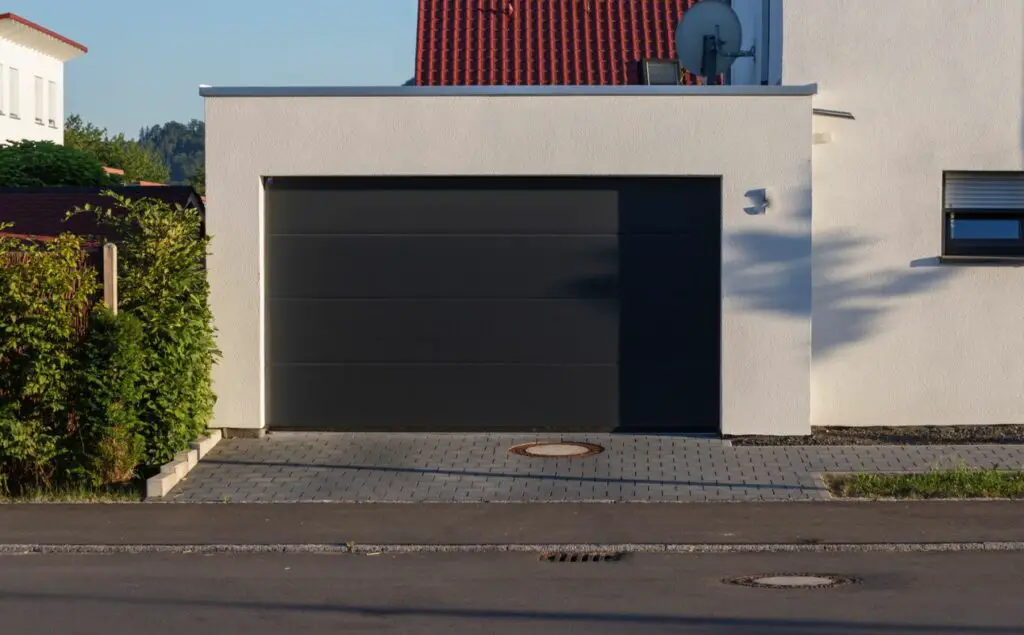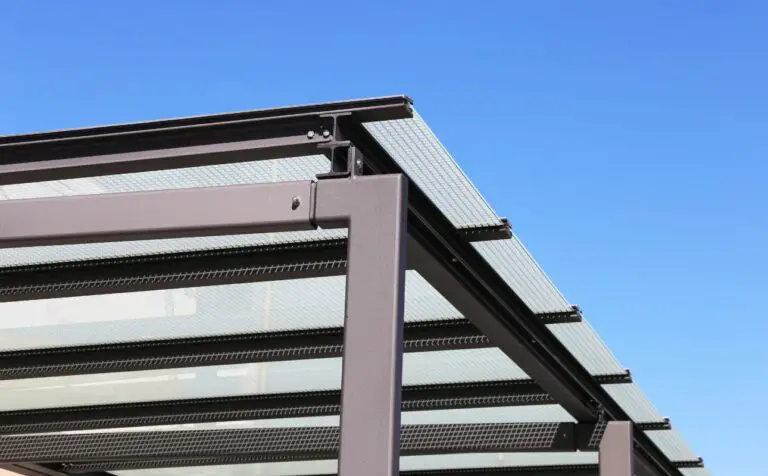When it comes to protecting your fifth wheel, a carport can be a great investment. With a carport, you can shield your vehicle from the elements and keep it in good condition for years to come.
Selecting the right size carport for your fifth wheel is essential to ensure that it fits properly and provides adequate protection. For optimal clearance when maneuvering your RV, it’s advised that your carport should have a height of 12 feet.
While the average RV measures around 12 feet in width, those equipped with slide-out sides can reach up to 18 feet. Therefore, always ensure your carport’s dimensions accommodate your RV’s size, including any additional features it might have.
In this article, we will guide you through the process of determining what size carport is suitable for your fifth wheel.

Measure Your Fifth Wheel
Wheel size and carport dimensions are critical factors to consider when deciding on the right size carport for your fifth wheel. Begin by measuring the height from the ground up to the top of the air conditioning unit, antennas, or any other gear that protrudes from your RV’s roof.
Next, measure its length from bumper to bumper, including any accessories that extend beyond it. Finally, take note of its width and ensure that you have enough clearance space for slide-outs or awnings.
These measurements will determine what size of carport is suitable for your fifth wheel’s dimensions. Once you have established these basic measurements, it is time to move onto considering your fifth wheel’s features when selecting an appropriate carport size.
Consider Your Fifth Wheel’s Features
Analyzing the dimensions and features of your recreational vehicle, in conjunction with the available space for shelter, is crucial to determine a suitable structure that can accommodate your fifth wheel securely.
When planning for a carport, it’s important to take into account the unique features of your fifth wheel camper. These specialized RVs come with distinctive features that might require additional considerations for storage.
- Slide-outs: Slide-outs add significant width to your RV when extended. Make sure your carport is wide enough to accommodate the RV with slide-outs fully extended if you plan on using them while the RV is parked.
- Height: Fifth wheels are typically taller than other RVs. Remember to include any rooftop additions like air conditioning units or satellite dishes in your height considerations.
- Length: The length of fifth wheel campers can vary greatly. Ensure your carport can accommodate the total length of your RV, including the hitch and any rear-mounted accessories like a ladder or spare tire.
- Access: Consider how you’ll access your RV’s doors and storage compartments. There should be enough space to fully open doors and access all areas of your RV without restriction.
- Future Upgrades: If you plan on adding features to your fifth wheel in the future, like a bike rack or a storage box, factor in these additions when planning your carport size.
Determine Clearance Requirements
To ensure that your RV can fit comfortably, you need to take accurate measurements of its height, width, and length. Additionally, consider any protruding features such as air conditioning units or satellite dishes that may require additional clearance.
You also need to factor in enough space around the vehicle to perform routine maintenance tasks like cleaning or repairs. Ultimately, choosing a carport with inadequate clearance or insufficient maneuvering room can lead to expensive damage and inconvenience.
Choose the Right Carport Size
Selecting a fitting shelter for your recreational vehicle necessitates considering factors such as the available space, dimensions of the RV, and any additional features that would need clearance; choosing an ill-suited one could lead to costly damages or inconvenience.
When determining the appropriate size of the carport for your 5th wheel, it is essential to consider design options and cost analysis. Carports come in different sizes, from small ones that can accommodate smaller RVs to larger ones that can fit multiple vehicles. Additionally, some carports have extra features like walls for added protection against harsh weather conditions or doors for easy access.
A larger carport may be ideal if you plan on using it for other purposes besides storing your 5th wheel or if you want to increase its resale value in case you decide to sell it later on.
Additional Considerations
When choosing a shelter for your recreational vehicle, it is important to consider other factors such as the material of the carport, location and weather conditions, and any potential building permits or regulations.
In addition to these considerations, there are some additional factors to keep in mind when determining what size carport you need for your 5th wheel. These may include the installation process, which could impact the size requirements due to space limitations or available tools and equipment.
It is also important to think about maintenance tips for your carport and RV since certain sizes may require more upkeep than others.
Lastly, be sure to factor in any future upgrades or modifications that may require a larger carport down the line. By taking all of these aspects into account, you can select a properly sized carport that will provide adequate protection for your 5th wheel investment while meeting all necessary regulations and ensuring easy access to maintenance needs.
The Bottom Line
When it comes to choosing the right carport size for your fifth wheel, there are several factors to consider.
First and foremost, you need to measure your fifth wheel accurately and take into account any features that may affect its height or width. You’ll need to determine the clearance requirements of your fifth wheel to ensure that it fits comfortably in the carport.
Once you have these measurements and considerations in mind, you can choose the right carport size for your needs.
Remember that a larger carport will offer more protection from the elements but may also be more expensive. Ultimately, it’s important to find a balance between affordability and functionality when selecting a carport for your fifth wheel.
With careful planning and consideration of all relevant factors, however, you can find a carport that provides the protection and peace of mind you need while on the road.
FAQ
Can a carport be used as a permanent storage solution for a fifth wheel?
On the one hand, carports offer protection from the elements which can prolong the life of your vehicle. They also provide an affordable alternative to traditional garages and can be easily installed on most properties.
However, it’s important to note that carports are not completely enclosed structures and therefore may not provide adequate protection in severe weather conditions. Additionally, they may require regular maintenance such as cleaning or repainting to ensure longevity.
Are there any building codes or permits required for installing a carport for a fifth wheel?
Building codes vary by location, with some areas having specific regulations on the size, height and placement of structures such as carports. Many municipalities require permits for construction projects such as this. Failure to obtain the necessary permits can result in fines or even legal issues down the line.
What materials are typically used to construct a carport for a fifth wheel?
Carports for fifth wheel RVs can be constructed using different materials like metal or wood. Metal carports are known for their durability and low maintenance, while wooden ones offer aesthetic appeal and customization options. The decision on which material to use ultimately depends on personal preference and budget constraints.





